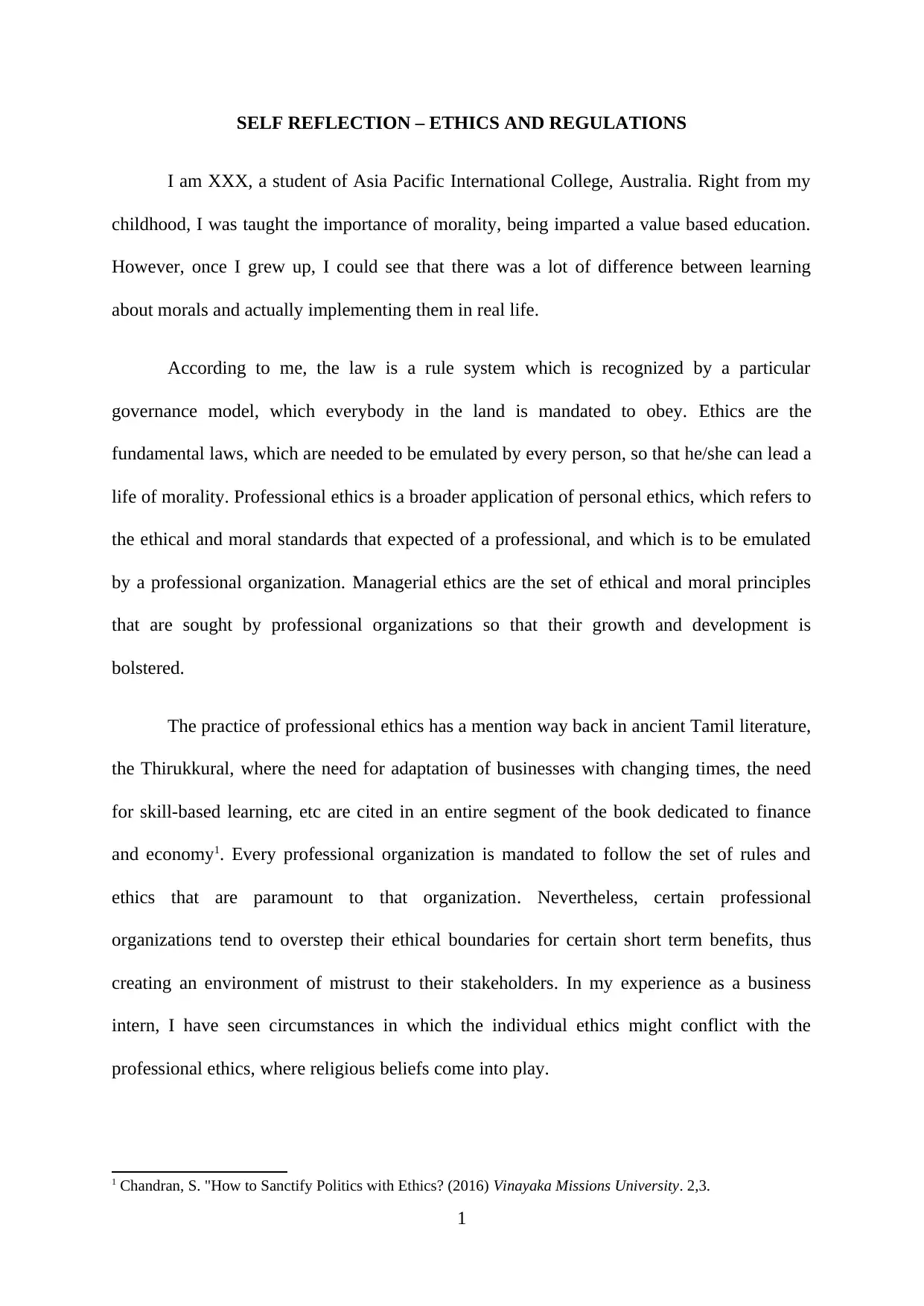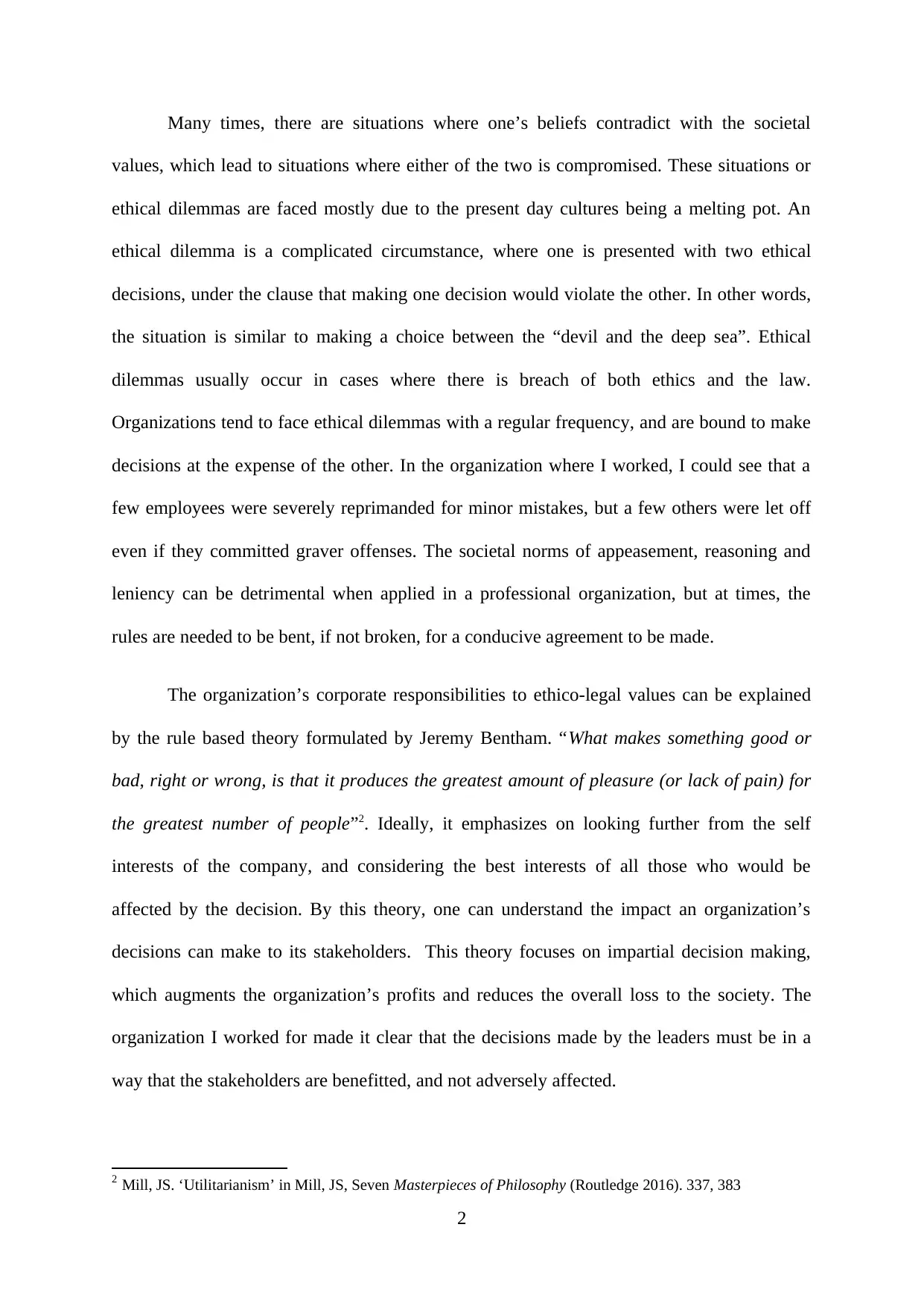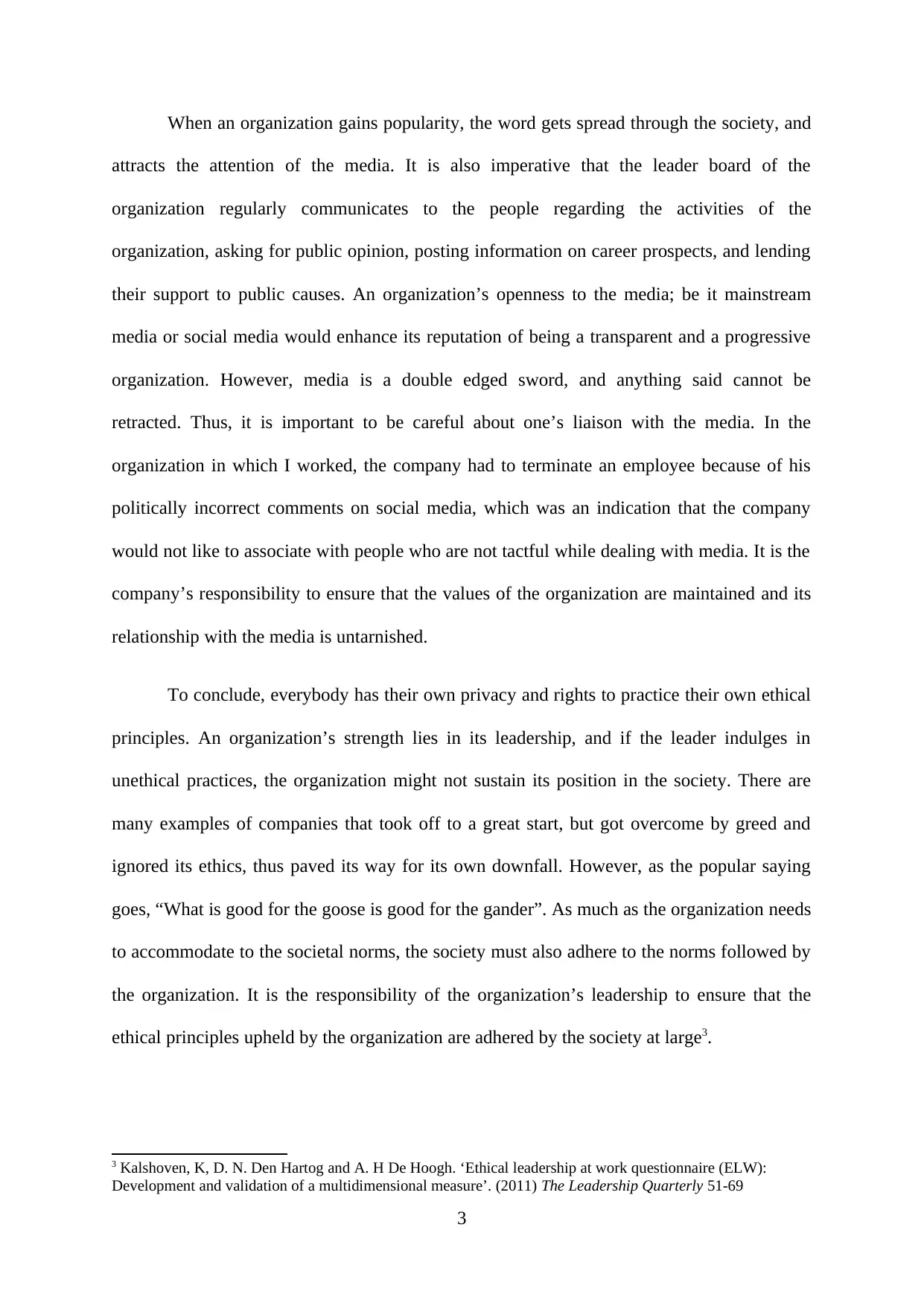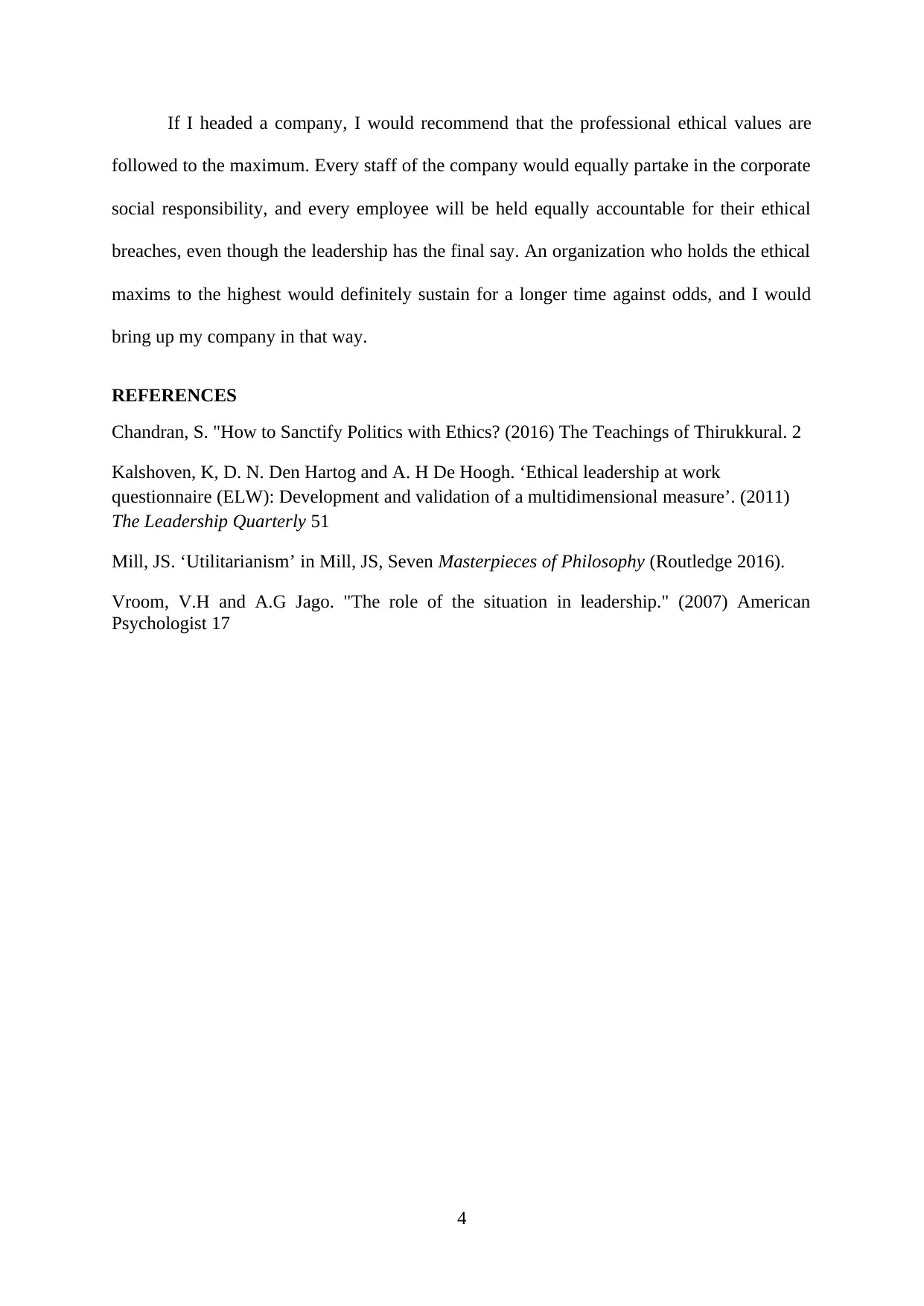Self-Reflection: Analyzing Ethics, Regulations, and Professional Life
VerifiedAdded on 2023/06/07
|4
|1336
|472
Essay
AI Summary
This essay is a student's self-reflection on the importance of ethics and regulations in professional life, drawing from personal experiences as a business intern. It discusses the conflict between individual and professional ethics, ethical dilemmas, and the application of rule-based theory in organizational decision-making. The essay also highlights the importance of media relations and ethical leadership, emphasizing the need for organizations to maintain transparency and uphold ethical principles to ensure long-term sustainability. The student concludes by advocating for a company culture that prioritizes ethical values and corporate social responsibility, with every employee held accountable for ethical breaches. Desklib provides this essay as a study resource, among a vast library of past papers and solved assignments, for students seeking to deepen their understanding of professional ethics.

SELF REFLECTION – ETHICS AND REGULATIONS
I am XXX, a student of Asia Pacific International College, Australia. Right from my
childhood, I was taught the importance of morality, being imparted a value based education.
However, once I grew up, I could see that there was a lot of difference between learning
about morals and actually implementing them in real life.
According to me, the law is a rule system which is recognized by a particular
governance model, which everybody in the land is mandated to obey. Ethics are the
fundamental laws, which are needed to be emulated by every person, so that he/she can lead a
life of morality. Professional ethics is a broader application of personal ethics, which refers to
the ethical and moral standards that expected of a professional, and which is to be emulated
by a professional organization. Managerial ethics are the set of ethical and moral principles
that are sought by professional organizations so that their growth and development is
bolstered.
The practice of professional ethics has a mention way back in ancient Tamil literature,
the Thirukkural, where the need for adaptation of businesses with changing times, the need
for skill-based learning, etc are cited in an entire segment of the book dedicated to finance
and economy1. Every professional organization is mandated to follow the set of rules and
ethics that are paramount to that organization. Nevertheless, certain professional
organizations tend to overstep their ethical boundaries for certain short term benefits, thus
creating an environment of mistrust to their stakeholders. In my experience as a business
intern, I have seen circumstances in which the individual ethics might conflict with the
professional ethics, where religious beliefs come into play.
1 Chandran, S. "How to Sanctify Politics with Ethics? (2016) Vinayaka Missions University. 2,3.
1
I am XXX, a student of Asia Pacific International College, Australia. Right from my
childhood, I was taught the importance of morality, being imparted a value based education.
However, once I grew up, I could see that there was a lot of difference between learning
about morals and actually implementing them in real life.
According to me, the law is a rule system which is recognized by a particular
governance model, which everybody in the land is mandated to obey. Ethics are the
fundamental laws, which are needed to be emulated by every person, so that he/she can lead a
life of morality. Professional ethics is a broader application of personal ethics, which refers to
the ethical and moral standards that expected of a professional, and which is to be emulated
by a professional organization. Managerial ethics are the set of ethical and moral principles
that are sought by professional organizations so that their growth and development is
bolstered.
The practice of professional ethics has a mention way back in ancient Tamil literature,
the Thirukkural, where the need for adaptation of businesses with changing times, the need
for skill-based learning, etc are cited in an entire segment of the book dedicated to finance
and economy1. Every professional organization is mandated to follow the set of rules and
ethics that are paramount to that organization. Nevertheless, certain professional
organizations tend to overstep their ethical boundaries for certain short term benefits, thus
creating an environment of mistrust to their stakeholders. In my experience as a business
intern, I have seen circumstances in which the individual ethics might conflict with the
professional ethics, where religious beliefs come into play.
1 Chandran, S. "How to Sanctify Politics with Ethics? (2016) Vinayaka Missions University. 2,3.
1
Paraphrase This Document
Need a fresh take? Get an instant paraphrase of this document with our AI Paraphraser

Many times, there are situations where one’s beliefs contradict with the societal
values, which lead to situations where either of the two is compromised. These situations or
ethical dilemmas are faced mostly due to the present day cultures being a melting pot. An
ethical dilemma is a complicated circumstance, where one is presented with two ethical
decisions, under the clause that making one decision would violate the other. In other words,
the situation is similar to making a choice between the “devil and the deep sea”. Ethical
dilemmas usually occur in cases where there is breach of both ethics and the law.
Organizations tend to face ethical dilemmas with a regular frequency, and are bound to make
decisions at the expense of the other. In the organization where I worked, I could see that a
few employees were severely reprimanded for minor mistakes, but a few others were let off
even if they committed graver offenses. The societal norms of appeasement, reasoning and
leniency can be detrimental when applied in a professional organization, but at times, the
rules are needed to be bent, if not broken, for a conducive agreement to be made.
The organization’s corporate responsibilities to ethico-legal values can be explained
by the rule based theory formulated by Jeremy Bentham. “What makes something good or
bad, right or wrong, is that it produces the greatest amount of pleasure (or lack of pain) for
the greatest number of people”2. Ideally, it emphasizes on looking further from the self
interests of the company, and considering the best interests of all those who would be
affected by the decision. By this theory, one can understand the impact an organization’s
decisions can make to its stakeholders. This theory focuses on impartial decision making,
which augments the organization’s profits and reduces the overall loss to the society. The
organization I worked for made it clear that the decisions made by the leaders must be in a
way that the stakeholders are benefitted, and not adversely affected.
2 Mill, JS. ‘Utilitarianism’ in Mill, JS, Seven Masterpieces of Philosophy (Routledge 2016). 337, 383
2
values, which lead to situations where either of the two is compromised. These situations or
ethical dilemmas are faced mostly due to the present day cultures being a melting pot. An
ethical dilemma is a complicated circumstance, where one is presented with two ethical
decisions, under the clause that making one decision would violate the other. In other words,
the situation is similar to making a choice between the “devil and the deep sea”. Ethical
dilemmas usually occur in cases where there is breach of both ethics and the law.
Organizations tend to face ethical dilemmas with a regular frequency, and are bound to make
decisions at the expense of the other. In the organization where I worked, I could see that a
few employees were severely reprimanded for minor mistakes, but a few others were let off
even if they committed graver offenses. The societal norms of appeasement, reasoning and
leniency can be detrimental when applied in a professional organization, but at times, the
rules are needed to be bent, if not broken, for a conducive agreement to be made.
The organization’s corporate responsibilities to ethico-legal values can be explained
by the rule based theory formulated by Jeremy Bentham. “What makes something good or
bad, right or wrong, is that it produces the greatest amount of pleasure (or lack of pain) for
the greatest number of people”2. Ideally, it emphasizes on looking further from the self
interests of the company, and considering the best interests of all those who would be
affected by the decision. By this theory, one can understand the impact an organization’s
decisions can make to its stakeholders. This theory focuses on impartial decision making,
which augments the organization’s profits and reduces the overall loss to the society. The
organization I worked for made it clear that the decisions made by the leaders must be in a
way that the stakeholders are benefitted, and not adversely affected.
2 Mill, JS. ‘Utilitarianism’ in Mill, JS, Seven Masterpieces of Philosophy (Routledge 2016). 337, 383
2

When an organization gains popularity, the word gets spread through the society, and
attracts the attention of the media. It is also imperative that the leader board of the
organization regularly communicates to the people regarding the activities of the
organization, asking for public opinion, posting information on career prospects, and lending
their support to public causes. An organization’s openness to the media; be it mainstream
media or social media would enhance its reputation of being a transparent and a progressive
organization. However, media is a double edged sword, and anything said cannot be
retracted. Thus, it is important to be careful about one’s liaison with the media. In the
organization in which I worked, the company had to terminate an employee because of his
politically incorrect comments on social media, which was an indication that the company
would not like to associate with people who are not tactful while dealing with media. It is the
company’s responsibility to ensure that the values of the organization are maintained and its
relationship with the media is untarnished.
To conclude, everybody has their own privacy and rights to practice their own ethical
principles. An organization’s strength lies in its leadership, and if the leader indulges in
unethical practices, the organization might not sustain its position in the society. There are
many examples of companies that took off to a great start, but got overcome by greed and
ignored its ethics, thus paved its way for its own downfall. However, as the popular saying
goes, “What is good for the goose is good for the gander”. As much as the organization needs
to accommodate to the societal norms, the society must also adhere to the norms followed by
the organization. It is the responsibility of the organization’s leadership to ensure that the
ethical principles upheld by the organization are adhered by the society at large3.
3 Kalshoven, K, D. N. Den Hartog and A. H De Hoogh. ‘Ethical leadership at work questionnaire (ELW):
Development and validation of a multidimensional measure’. (2011) The Leadership Quarterly 51-69
3
attracts the attention of the media. It is also imperative that the leader board of the
organization regularly communicates to the people regarding the activities of the
organization, asking for public opinion, posting information on career prospects, and lending
their support to public causes. An organization’s openness to the media; be it mainstream
media or social media would enhance its reputation of being a transparent and a progressive
organization. However, media is a double edged sword, and anything said cannot be
retracted. Thus, it is important to be careful about one’s liaison with the media. In the
organization in which I worked, the company had to terminate an employee because of his
politically incorrect comments on social media, which was an indication that the company
would not like to associate with people who are not tactful while dealing with media. It is the
company’s responsibility to ensure that the values of the organization are maintained and its
relationship with the media is untarnished.
To conclude, everybody has their own privacy and rights to practice their own ethical
principles. An organization’s strength lies in its leadership, and if the leader indulges in
unethical practices, the organization might not sustain its position in the society. There are
many examples of companies that took off to a great start, but got overcome by greed and
ignored its ethics, thus paved its way for its own downfall. However, as the popular saying
goes, “What is good for the goose is good for the gander”. As much as the organization needs
to accommodate to the societal norms, the society must also adhere to the norms followed by
the organization. It is the responsibility of the organization’s leadership to ensure that the
ethical principles upheld by the organization are adhered by the society at large3.
3 Kalshoven, K, D. N. Den Hartog and A. H De Hoogh. ‘Ethical leadership at work questionnaire (ELW):
Development and validation of a multidimensional measure’. (2011) The Leadership Quarterly 51-69
3
⊘ This is a preview!⊘
Do you want full access?
Subscribe today to unlock all pages.

Trusted by 1+ million students worldwide

If I headed a company, I would recommend that the professional ethical values are
followed to the maximum. Every staff of the company would equally partake in the corporate
social responsibility, and every employee will be held equally accountable for their ethical
breaches, even though the leadership has the final say. An organization who holds the ethical
maxims to the highest would definitely sustain for a longer time against odds, and I would
bring up my company in that way.
REFERENCES
Chandran, S. "How to Sanctify Politics with Ethics? (2016) The Teachings of Thirukkural. 2
Kalshoven, K, D. N. Den Hartog and A. H De Hoogh. ‘Ethical leadership at work
questionnaire (ELW): Development and validation of a multidimensional measure’. (2011)
The Leadership Quarterly 51
Mill, JS. ‘Utilitarianism’ in Mill, JS, Seven Masterpieces of Philosophy (Routledge 2016).
Vroom, V.H and A.G Jago. "The role of the situation in leadership." (2007) American
Psychologist 17
4
followed to the maximum. Every staff of the company would equally partake in the corporate
social responsibility, and every employee will be held equally accountable for their ethical
breaches, even though the leadership has the final say. An organization who holds the ethical
maxims to the highest would definitely sustain for a longer time against odds, and I would
bring up my company in that way.
REFERENCES
Chandran, S. "How to Sanctify Politics with Ethics? (2016) The Teachings of Thirukkural. 2
Kalshoven, K, D. N. Den Hartog and A. H De Hoogh. ‘Ethical leadership at work
questionnaire (ELW): Development and validation of a multidimensional measure’. (2011)
The Leadership Quarterly 51
Mill, JS. ‘Utilitarianism’ in Mill, JS, Seven Masterpieces of Philosophy (Routledge 2016).
Vroom, V.H and A.G Jago. "The role of the situation in leadership." (2007) American
Psychologist 17
4
1 out of 4
Related Documents
Your All-in-One AI-Powered Toolkit for Academic Success.
+13062052269
info@desklib.com
Available 24*7 on WhatsApp / Email
![[object Object]](/_next/static/media/star-bottom.7253800d.svg)
Unlock your academic potential
Copyright © 2020–2026 A2Z Services. All Rights Reserved. Developed and managed by ZUCOL.





